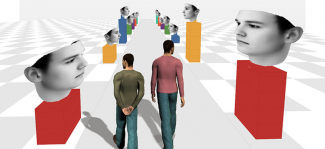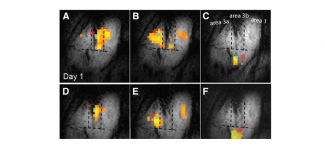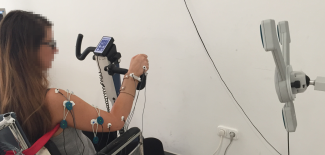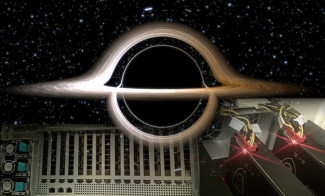Department of Computational Sciences
Department of Computational Sciences
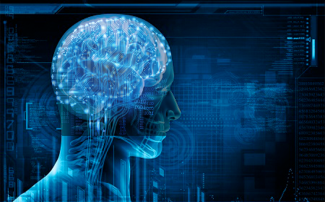 Department leader
Telcs András
Department leader
Telcs András
Department of Computational Sciences (DoCS) is a small interdisciplinary team active on computational neurosciencecognitive neuroscience, neuro-rehabilitation, computational social science, mathematics and theoretical physics.
It is a renewable source of advanced research computing knowledge. It has a dual mission: on one hand supports and complements ongoing in-house research projects and on the other hand serves as methodological focal point for the broader community of researchers in Hungary by helping them to keep their acknowledged position on the forefront, catching up and being in synchrony with the changes of the machine empowered research.
Vision
Digital revolution transform research and put it into unprecedented pace. Wigner, Neumann, Gabor, Karman, many recent Hungarian scientists on the research forefront, all poses deep understanding of mathematics, algorithms and advantages computers can provide. The tradition should be alive.
Computational science is an emerging if not a revolutionary field of scientific methodology and via machine learning, artificial intelligence, data science itself is a challenging new research field. Hungary has strong tradition in mathematics and physics dating back to the previous century. In the recent years Hungarian data science, data mining and neuroscience evolves in the direction which might lead to similar prominent position in the scientific world. Very recent initiatives launched by the social science community are pointing to the same direction. There is no doubt that top notch researchers all over the world reach and keep their activity on the very forefront of the research by the professional utilization of high performance computing of one or other form in conjunction with state of the art expertise in Advanced Research Computing (in the broad sense (ARC) ).
We include in ARC numerical methods, advanced statistics including Bayesian inference, dynamical and complex systems in conjunction with advanced data preprocessing, signal analysis (time series analysis, spatial distributions and morphometry), causality analysis, neural networks, deep learning, parallel programing and cloud/grid/ architecture design and application etc. (without being very strict and precise). We dare to apply for such a loose definition given that the field is developing so rapidly and changes its shape and frontline that any definition dates out before we formulate it.
Studying the history of the ARC practitioner groups we can observe that all evolved out from groups of scientists active on a “classical” branch of science like physics, economy or linguistic. The entry barriers are high, emergence of new application groups are slow.
The presidency of the Hungarian Academy of Sciences made a strategic decision and invested into the development of the Academic Cloud. The actual infrastructure is maintained at the Wigner Data Center and SzTAKI. The pilot year 2016-17 ended with several successful projects. The project typically came from research groups which already acquired ARC knowledge in their own field.
In the meantime no center of knowledge accumulation and transfer has been established with that single task. As a result research groups with no, or little ARC background still face to the high entry barriers:
-Finding partners with ARC knowledge
-Acquiring basic theoretic ARC knowledge
-Acquiring basic programing skills
-Acquiring basic knowledge and experience in utilisation of HPC architecture/infrastructure
One of the main goals of the CSD is to serve as a knowledge center and to support groups using the Academic ARC infrastructure.
Human resource background of the department
The members of the department are on different stage of their scientific career and poses diverse expertise in ARC and scientific background: biologist, physicist, mathematician, with specialization in computational neuroscience, neuroscience modeling, brain connectomics, neuroinformatics, stochastic processes, time series analysis, GPU programing, parallel programing, machine learning, Bayesian statistics, complex systems.
The department proactively expands its research and IT staff to accommodate new projects and give appropriate service support to external groups.
The Department has two main goals: on one hand to support in-house research, on the other to assist external groups in fulfilling their research goals by providing knowledge in utilisation of the Academic cloud facility.
That goal is reached not only with excellent research results and acquired scientific promotions (PhD and academic doctoral degrees) but establishing the department as the founder of the Hungarian computational neuroscience school.
Furthermore, the department promote itself into the position of a well-known center of advanced research computing expertise within the Hungarian research community. Carries out research in that field and applies state of-the-art methodology.
The department flexibly adapts to the evolving needs of the Hungarian research community/ At present visible and promising focus areas are
Computational neuroscience
Computational social science
Data mining, network science in sociology
Computational linguistic
Computational economics and economics modeling
Computational physics
Computational environment science and biology.
In line with the department mission, members take part in the promotion and on a daily base in the development of the computational science profile of the department and the Hungarian research community.
The department has advisory support to computational efforts of existing research projects, initiate and attract new collaborations and take part in grant application with its ARC expertise.
The department is structured in research groups around PI-s, who are senior researchers, grant winners of different calls.
Department of Computational Sciences

Department of Computational Sciences (DoCS) is a small interdisciplinary team active on computational neurosciencecognitive neuroscience, neuro-rehabilitation, computational social science, mathematics and theoretical physics.
It is a renewable source of advanced research computing knowledge. It has a dual mission: on one hand supports and complements ongoing in-house research projects and on the other hand serves as methodological focal point for the broader community of researchers in Hungary by helping them to keep their acknowledged position on the forefront, catching up and being in synchrony with the changes of the machine empowered research.
Vision
Digital revolution transform research and put it into unprecedented pace. Wigner, Neumann, Gabor, Karman, many recent Hungarian scientists on the research forefront, all poses deep understanding of mathematics, algorithms and advantages computers can provide. The tradition should be alive.
Computational science is an emerging if not a revolutionary field of scientific methodology and via machine learning, artificial intelligence, data science itself is a challenging new research field. Hungary has strong tradition in mathematics and physics dating back to the previous century. In the recent years Hungarian data science, data mining and neuroscience evolves in the direction which might lead to similar prominent position in the scientific world. Very recent initiatives launched by the social science community are pointing to the same direction. There is no doubt that top notch researchers all over the world reach and keep their activity on the very forefront of the research by the professional utilization of high performance computing of one or other form in conjunction with state of the art expertise in Advanced Research Computing (in the broad sense (ARC) ).
We include in ARC numerical methods, advanced statistics including Bayesian inference, dynamical and complex systems in conjunction with advanced data preprocessing, signal analysis (time series analysis, spatial distributions and morphometry), causality analysis, neural networks, deep learning, parallel programing and cloud/grid/ architecture design and application etc. (without being very strict and precise). We dare to apply for such a loose definition given that the field is developing so rapidly and changes its shape and frontline that any definition dates out before we formulate it.
Studying the history of the ARC practitioner groups we can observe that all evolved out from groups of scientists active on a “classical” branch of science like physics, economy or linguistic. The entry barriers are high, emergence of new application groups are slow.
The presidency of the Hungarian Academy of Sciences made a strategic decision and invested into the development of the Academic Cloud. The actual infrastructure is maintained at the Wigner Data Center and SzTAKI. The pilot year 2016-17 ended with several successful projects. The project typically came from research groups which already acquired ARC knowledge in their own field.
In the meantime no center of knowledge accumulation and transfer has been established with that single task. As a result research groups with no, or little ARC background still face to the high entry barriers:
-Finding partners with ARC knowledge
-Acquiring basic theoretic ARC knowledge
-Acquiring basic programing skills
-Acquiring basic knowledge and experience in utilisation of HPC architecture/infrastructure
One of the main goals of the CSD is to serve as a knowledge center and to support groups using the Academic ARC infrastructure.
Human resource background of the department
The members of the department are on different stage of their scientific career and poses diverse expertise in ARC and scientific background: biologist, physicist, mathematician, with specialization in computational neuroscience, neuroscience modeling, brain connectomics, neuroinformatics, stochastic processes, time series analysis, GPU programing, parallel programing, machine learning, Bayesian statistics, complex systems.
The department proactively expands its research and IT staff to accommodate new projects and give appropriate service support to external groups.
The Department has two main goals: on one hand to support in-house research, on the other to assist external groups in fulfilling their research goals by providing knowledge in utilisation of the Academic cloud facility.
That goal is reached not only with excellent research results and acquired scientific promotions (PhD and academic doctoral degrees) but establishing the department as the founder of the Hungarian computational neuroscience school.
Furthermore, the department promote itself into the position of a well-known center of advanced research computing expertise within the Hungarian research community. Carries out research in that field and applies state of-the-art methodology.
The department flexibly adapts to the evolving needs of the Hungarian research community/ At present visible and promising focus areas are
Computational neuroscience
Computational social science
Data mining, network science in sociology
Computational linguistic
Computational economics and economics modeling
Computational physics
Computational environment science and biology.
In line with the department mission, members take part in the promotion and on a daily base in the development of the computational science profile of the department and the Hungarian research community.
The department has advisory support to computational efforts of existing research projects, initiate and attract new collaborations and take part in grant application with its ARC expertise.
The department is structured in research groups around PI-s, who are senior researchers, grant winners of different calls.
Group Leader: Laczkó József
Webpage: rehab.wigner.mta.hu
The Rehabilitation-technology Research Group has begun its work several decades ago at the then KFKI Research Institute (now Wigner Research Centre for Physics). Its initial aim was to facilitate the every-day life and work of the blind, deafblind and motion impaired. Later it became evident that some of the solutions developed by LSTR provide a significant help for non-verbal autistic people, too.
Group leader: Antal Jakovác
The website of the group: http://gpu.wigner.mta.hu/en/


